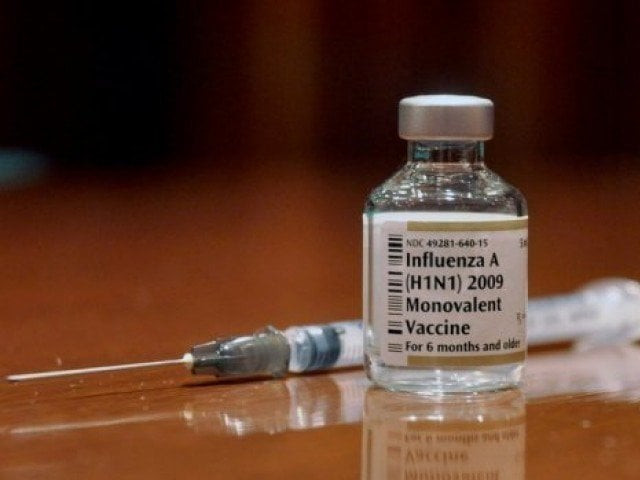On the rise: Flu claims 19 lives in Pakistan this month, says NIH
A total of 159 patients have tested positive for the virus

A total of 159 patients have tested positive for the virus. PHOTO: AFP
NIH, a collaborative centre for research and training in viral diagnostics for the World Health Organisation (WHO) in Islamabad, has reported that different public and private hospitals across the country and NIH’s seven laboratory-based influenza surveillance sites have received 575 suspect patient samples since the start of January. Of these, 159 tested positive for influenza A H1N1, and 19 people of them have died.
Another patient dies of swine flu in Rawalpindi
Influenza-A H1N1 was among the most common strains.
NIH’s focal person for international health regulations Dr Muhammad Salman told The Express Tribune that the institute, along with hospitals from the Islamabad Capital Territory (ICT), Punjab and Sindh, have received a total of 103 suspected flu patients on Friday alone, of which 21 tested positive for the H1N1 virus —14 for influenza A, five for influenza A (H3), and two for influenza B.
He further said that a total of 32 samples were brought to
NIH from hospitals in Rawalpindi and Islamabad. Of these, nine tested positive for seasonal influenza.
The information shared by NIH showed that two patients admitted in Shifa International Hospital, Islamabad, tested positive for H1N1 and influenza B.
The Federal Government Services Hospital (FGSH), Islamabad admitted 10 suspected influenza patients, one of whom tested positive for H1N1, two for influenza A (H3), and another was affected by influenza B.
No swine flu case reported in Islamabad
The Holy Family Hospital, Rawalpindi, received a total of 13 cases of which one was tested positive for influenza A (H3).
CMH Kharian, CMH Lahore and DHMC Hospital, Lahore admitted one patient each with H1N1.
In POF Hospital, Wah Cantt, one patient was confirmed to have H1N1.Fauji Foundation Hospital, Rawalpindi received two patients, one of whom tested positive for H1NI.
Nishter Medical College (NMC), Multan, admitted a total of 20 patients, three of whom tested positive for H1N1, and one for Influenza A (H3).
NIH shared that Civil Hospital, Karachi received a total of six patients suspected of being affected by seasonal influenza, one of whom tested positive for H1N1, and one for influenza A (H3).
Punjab had the most cases, with 11 patients confirmed to have seasonal H1N1 influenza, and two patients testing positive for influenza A (H3) on Friday.
WHO assures support
The World Health Organisation (WHO) on Saturday assured its support to the current awareness campaign initiated by the federal and provincial health authorities in addressing H1N1 within the internationally recognised norms and guidance.
WHO Representative Dr Michel Thieren, in a press statement, said that the organisation considers paramount the singular role and responsibility of the medical and health professionals to confirm proper messaging regarding H1N1 in order to systematically dispel any misconception about the illness.
Epidemic threat: CM seeks foolproof measures to contain swine flu
“To avoid the spread of false rumours amenable to generate panic and malpractice around the disease, the role of the press is also critical,” he said.
He stressed that H1N1 does not require any specific hospital rearrangement in the form of confinement or personal protective equipment, adding that systematic hand washing and mask protection, along with basic hospital hygiene, are the basic occupational measures that medical and health professionals must observe.
Published in The Express Tribune, January 24th, 2016.



















COMMENTS
Comments are moderated and generally will be posted if they are on-topic and not abusive.
For more information, please see our Comments FAQ